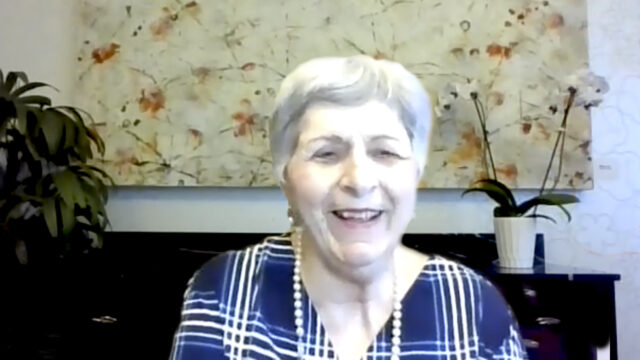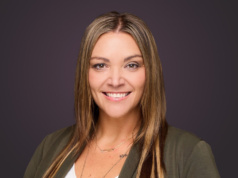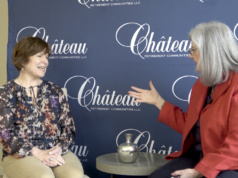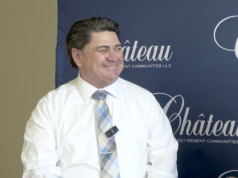Suzanne: Welcome to Answers for Elders Radio Network, and we are back again with Era Living, and we’ve had such a great time talking to the various staff members in the various communities. But this time we’re here for a special treat, because we are going to be speaking with a lady by the name of Peg Hall. And Peg is a resident at Era Living at Aljoya Thornton Place, and that’s up by Northgate in North Seattle, Washington. Peg, thank you so much for being on this show today.
Peg Hall: You’re welcome.
Suzanne: You have a very interesting background. Before we get into your life at Era Living, could you give us a little bit of information about your background? Because I love the story that you shared with me.
Peg Hall: Well, I’m from the East Coast, grew up in New Jersey. After I was married, left the east Coast, went to various other cities. My husband was an Air Force officer. We were in Japan, and while we were in Japan, we had our first child. And then when we came back, we seemed to migrate to the west coast, raised our family in California, and continued north and now in Seattle.
Suzanne: And you got to Seattle and you stayed here.
Peg Hall: Yes, because the son I have living in Seattle was very persuasive.
Suzanne: Well, there you are. Well, we’re glad you’re still here, and you obviously moved into Aljoya — a little bit of a story because you needed a higher degree of care, but your quality of life got better and now you’re more independent. And I would love to learn a little bit about the story of your experience with Era Living.
Peg Hall: Well, when I first moved into Aljoya, I was independent. I wasn’t meeting many people, because the pandemic was going on, and I joke about how I used to go to the trash room to meet the other residents. We didn’t have activities or meals together, but it was 2020. What could you do? And after I was here three months, we would go outside and get some exercise, taking a walk. And unexpectedly I got some vertigo, crashed to the ground, and had a severe break to my backbone. And they were able to help me here. In a couple of days, I was at the hospital, then I had surgery, and then I went to rehab for six weeks and I was kind of in shock during that time. And of course, as I improved, they said, well, now you can get to go home… compute home, well, that’s Aljoya. And I was so grateful that I could go back to my apartment and not like in some senior residences where you have to move to another area. I got back to my original apartment with lots of help, and the caregivers — this was assisted living — caregivers coming in very often. Staff watched me closely. My family came frequently. So with all therapists came three kinds of therapy coming right into my apartment. I did not have to leave. Fortunately, my insurance covered that. During this long period of assisted living, I gradually got better, was able to get in and out of the bed by myself, et cetera. So then I got out of assisted and into independent living where I am now.
Suzanne: That was awesome. And so tell me about your apartment. What’s it like?
Peg Hall: It’s small. It’s a one bedroom with a den. I was very specific about wanting the den even though it’s very small. I knew that I had a little love seat that opened up into a bed, a single bed, so that if I had one guest, they could stay in my apartment with me. That has happened a lot. I just had somebody last month and you know, it’s kind of a tight squeeze. You have to take the desk chair and put it in the kitchen when someone’s sleeping there. That’s ok. It works. The bathroom is lovely and the washer and dryer are stacked in the bathroom. So it has everything that you need and a complete kitchen, full size appliances with that, not that you cook a lot, but now that I’m on independent living, I do like to fix some meals.
Suzanne: Uh-huh. And obviously you have the freedom to do so and all the amenities for like that you wanna have. So what’s a typical day look like? Now for you, living at Aljoya.
Peg Hall: Well, for me, because I’m still recuperating. I have some self-massage routine,s and some exercise a couple of days a week. I have a therapist, but I usually go to several activities and then go to the restaurant for the evening meal. Today there’s an activity about sleeping, slumber, and how it works for you. And another talk by a philosopher about sports in our lives. That’s fascinating to me. There’s talks on many, many different subjects. Last week we had a speed-friending event. It would take too long to explain how it works. But it was a lot of fun.
Suzanne: Tell me about the connections you make with people that live in your community.
Peg Hall: Well, through the activities, the meals, and just living here, you get to know just about everybody, if not by name, by sight. You have name tags, which is very helpful. If you’re not sure of somebody’s name, you just read their name tag. And when somebody new comes, we make a special effort. Invite them to dinner and so forth. So, I like the people part of it very much. It’s not so big that you can’t meet everyone at some point or other. It’s a good thing.
Suzanne: It’s not too small where you feel like you won’t meet somebody that could be a friend, but it’s not so large that you feel like a number. And I think that’s one of the nice things that the communities Era Living has, they’re all just really nice size. They’re not overwhelmingly large. So you get up every day, and you’ve had assisted living. So there’s caregiving. But you also get house-cleaning services. Tell us a little bit about what that’s like,
Peg Hall: It’s once a week. My day is Monday, and you have a regular time. So I know I try and clear out of there, straighten up so that they can clean, and leave the apartment for an hour, and that involves changing the linens, the towels, and a very good job on bathrooms and kitchens. Nice not to have to do that. Vacuuming and so forth. I don’t do any cleaning.
Suzanne: That’s nice, it’s like life is really different now that you’re in a senior living community like that. Can you imagine when you were in your home, all the things that you had to do before. How’s that changed your life?
Peg Hall: It leaves you more time and freedom to do some of the other things I really want to work on me. A memoir that I’ve had the material for and I haven’t gotten to it. I said, oh, no reason why I can’t do it now, except that I’m too busy going to the activities.
Suzanne: Well, and see, that’s what’s important too. And so you’ve been there since 2020 with a little segue way. But obviously you know, it’s your home now.
Peg Hall: Yeah, this is home and, and will be,
Suzanne: I think it’s so great because there’s so many seniors out there that may think, “I’m staying at home, I’m gonna lose my freedom,” and it sounds like just absolutely opposite. In many cases you have more freedom now.
Peg Hall: One feature that I enjoy is that they pick up my groceries for me. I order them online and the curbside pickup happens. It doesn’t cost anything. I just do it once a week. But I’ve gotten into that routine.
Suzanne: That’s great. And so you don’t have to worry about putting yourself in situations where you can still stay safe. Unfortunately COVID is still somewhat with us at times, but there’s all kinds of efforts obviously like that, that you don’t have to go into those areas if you don’t want to.
Peg Hall: And I did not take my car when I moved here. I sold my car. The curbside groceries helps me. And then, of course, Amazon Prime. That’s how we get everything.
Suzanne: I love that too. What advice would you give somebody that is looking into a retirement community?
Peg Hall: I think you have to decide what is important to you. If you’re a people person, then you want to be in a place where you have an opportunity to meet people, and you have to decide if you want a large place — some of them are like hotels to meet their high rise — or a smaller, homier place. And then the first one I looked at was about 25 miles away from the center of the city. And I thought, that’s gonna be too far. I wanna enjoy the cultural and educational things that we have in Seattle, I don’t want to be too far out in the boonies. So the location would be important.
Suzanne: And you’re right by the light rail, which is really nice.
Peg Hall: The light rail is excellent, and then we’re not far from the museums and theaters. They’re a very short drive from here. Many of our Aljoya trips are to the ballet, the symphony, where people want to sign up for it.
Suzanne: Thinking about advice moving forward, you’re in a small apartment. There’s also apartments that are bigger, but it’s interesting because I happen to know you probably don’t spend that much time in your apartment except for rare situations, you’re like out and about in the community.
Peg Hall: Most of the time, things are going on. Now, I take advantage of the little gym we have here too and work out on a machine.
Suzanne: That’s great. And then of course you work with physical therapists and things like that. So how does that work as you live there in the community?
Peg Hall: The ones that I have come to me, and we have an appointment at a certain time. And they keep giving me goals, or we keep setting goals, we go over, and we have to have another goal. You mentioned light rail. It’s close, but I haven’t been on it yet, but that’s one of my goals, to get to run on the light.
Suzanne: Yeah. And obviously so if you’re looking at retirement living, the nice thing about being where you are, you’re at the light rail, you’re close to the city, but you’re not in the city, but there are communities that Era Living has in Bellevue, Renton, different areas in Seattle. You have the opportunity to choose any of those types of communities. It’s the same culture. What do you found that is most valuable with the staff?
Peg Hall: With the staff? Well, a friend of mine came to one of our events, and she noticed that the staff and the residents genuinely seem to like one another. And I think that’s a big tribute, and it’s true, and it is really the secret to our success.
Suzanne: Well, Peg, thank you so much for being on the show and sharing your experience. I always say that, when you’re in a good community like you are, it’s a wonderful quality of life to live and I am so glad I got to meet you.
Speaker 2: Thank you. Likewise.














